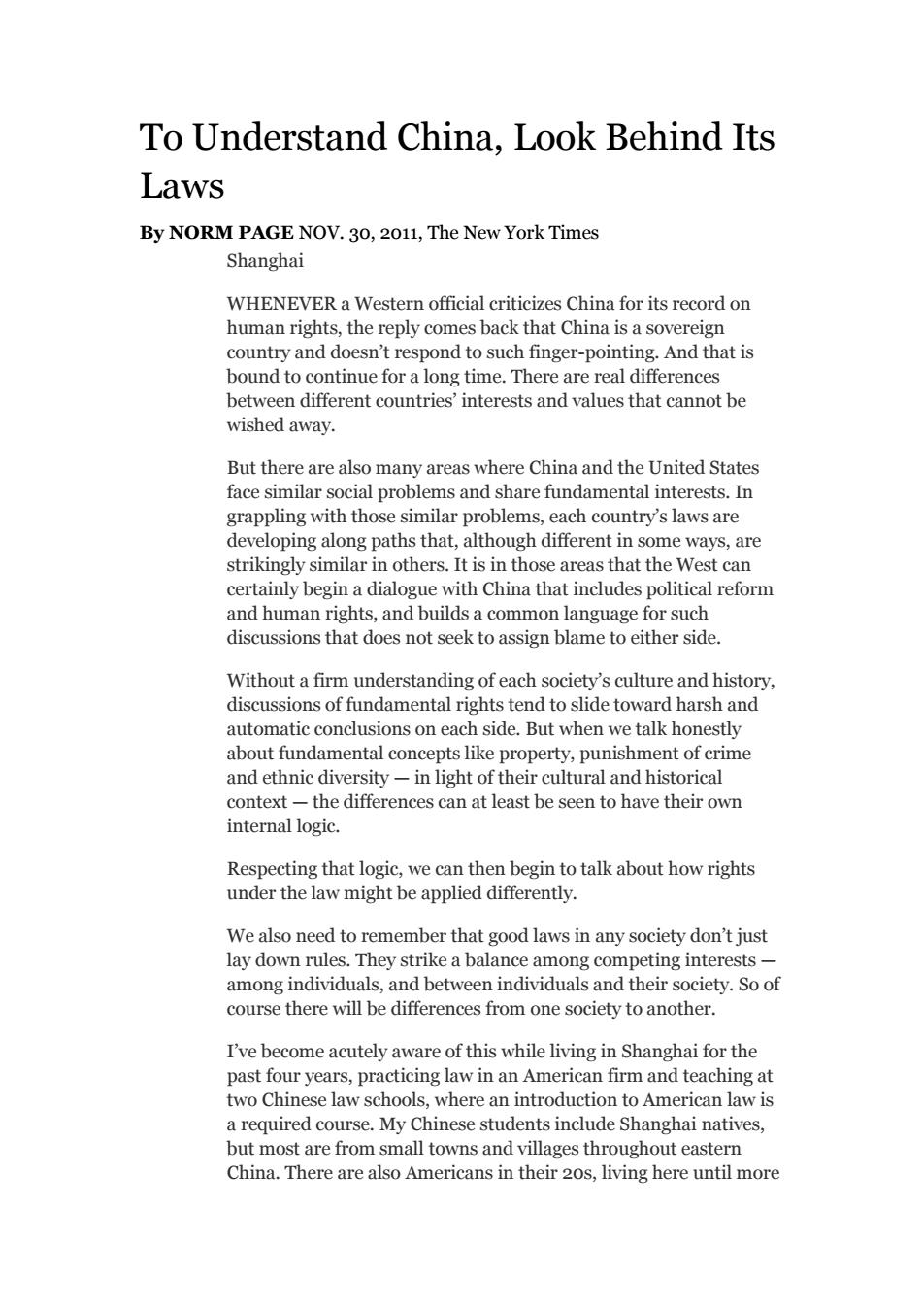正在加载图片...

To Understand China,Look Behind Its Laws By NORM PAGE NOV.30,2011,The New York Times Shanghai WHENEVER a Western official criticizes China for its record on human rights,the reply comes back that China is a sovereign country and doesn't respond to such finger-pointing.And that is bound to continue for a long time.There are real differences between different countries'interests and values that cannot be wished away. But there are also many areas where China and the United States face similar social problems and share fundamental interests.In grappling with those similar problems,each country's laws are developing along paths that,although different in some ways,are strikingly similar in others.It is in those areas that the West can certainly begin a dialogue with China that includes political reform and human rights,and builds a common language for such discussions that does not seek to assign blame to either side. Without a firm understanding of each society's culture and history, discussions of fundamental rights tend to slide toward harsh and automatic conclusions on each side.But when we talk honestly about fundamental concepts like property,punishment of crime and ethnic diversity-in light of their cultural and historical context-the differences can at least be seen to have their own internal logic. Respecting that logic,we can then begin to talk about how rights under the law might be applied differently. We also need to remember that good laws in any society don't just lay down rules.They strike a balance among competing interests- among individuals,and between individuals and their society.So of course there will be differences from one society to another. I've become acutely aware of this while living in Shanghai for the past four years,practicing law in an American firm and teaching at two Chinese law schools,where an introduction to American law is a required course.My Chinese students include Shanghai natives, but most are from small towns and villages throughout eastern China.There are also Americans in their 20s,living here until moreTo Understand China, Look Behind Its Laws By NORM PAGE NOV. 30, 2011, The New York Times Shanghai WHENEVER a Western official criticizes China for its record on human rights, the reply comes back that China is a sovereign country and doesn’t respond to such finger-pointing. And that is bound to continue for a long time. There are real differences between different countries’ interests and values that cannot be wished away. But there are also many areas where China and the United States face similar social problems and share fundamental interests. In grappling with those similar problems, each country’s laws are developing along paths that, although different in some ways, are strikingly similar in others. It is in those areas that the West can certainly begin a dialogue with China that includes political reform and human rights, and builds a common language for such discussions that does not seek to assign blame to either side. Without a firm understanding of each society’s culture and history, discussions of fundamental rights tend to slide toward harsh and automatic conclusions on each side. But when we talk honestly about fundamental concepts like property, punishment of crime and ethnic diversity — in light of their cultural and historical context — the differences can at least be seen to have their own internal logic. Respecting that logic, we can then begin to talk about how rights under the law might be applied differently. We also need to remember that good laws in any society don’t just lay down rules. They strike a balance among competing interests — among individuals, and between individuals and their society. So of course there will be differences from one society to another. I’ve become acutely aware of this while living in Shanghai for the past four years, practicing law in an American firm and teaching at two Chinese law schools, where an introduction to American law is a required course. My Chinese students include Shanghai natives, but most are from small towns and villages throughout eastern China. There are also Americans in their 20s, living here until more